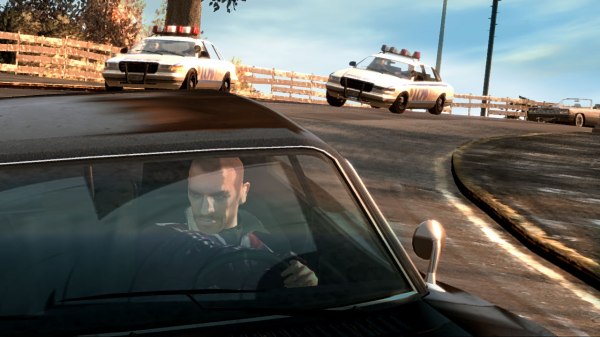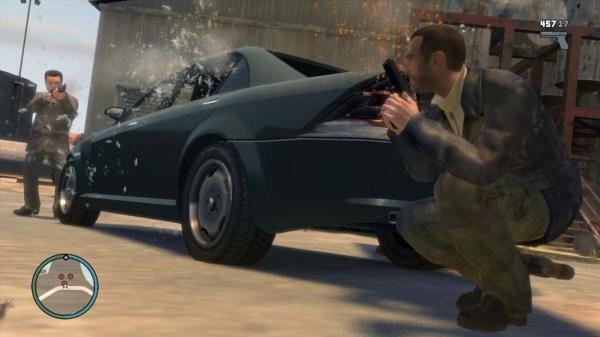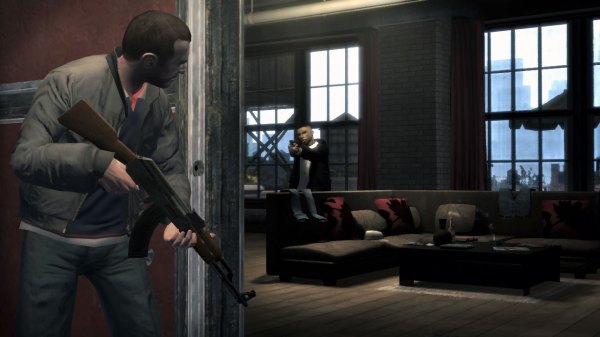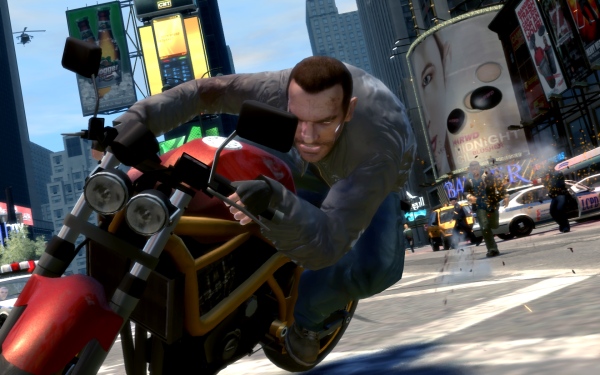 In part 1 of the retrospective, I examined the role of Liberty City in Grand Theft Auto IV, namely the conflict between control and openness the game world.
In part 1 of the retrospective, I examined the role of Liberty City in Grand Theft Auto IV, namely the conflict between control and openness the game world.
There is nothing more shocking than the moment players take their first steps as Niko Belic. Niko has a real sense of weight, a presence in the world. He can’t stop on a dime, he rounds corners, subtly shifting his body weight to his side, leaning on one leg and raising his often busy trigger finger to prep for one more kill. Every moment in controlling Belic has presence, a place. He’s not of Liberty City but he is Liberty City, a weapon in the hands of the highest bidder.
There’s a real disconnect between the player and Belic which never entirely goes away in Grand Theft Auto IV. Belic is a killer, a man trained to extinguish lives and, after seeing the atrocities in an unnamed Eastern European war, lacking the moral compunction to think about his actions. Players demand freedom, control of their destinies, fate and action. Niko pivotally lacks that control, seeing his actions as an inevitability. Niko kills, has killed, will kill again.
 In a way, Niko is guided not only by the hand of the player but by the voices of Liberty City. He’s controlled like a marionette by an ever increasing number of low-lives, from the soon-to-be-pinned coke dealer Elizabetha Torres, the perpetually chasing his past Packie McReary, the soon to be gone Jon Gravelli and the man grabbing at an impossible dream, Jimmy Pegorino. The story of Grand Theft Auto IV maintains a consistent tone of failure, both personal and of the American Dream, by focusing on these characters, eternally looking to seize something a country promised and the entitlement which comes with our perceived privilege.
In a way, Niko is guided not only by the hand of the player but by the voices of Liberty City. He’s controlled like a marionette by an ever increasing number of low-lives, from the soon-to-be-pinned coke dealer Elizabetha Torres, the perpetually chasing his past Packie McReary, the soon to be gone Jon Gravelli and the man grabbing at an impossible dream, Jimmy Pegorino. The story of Grand Theft Auto IV maintains a consistent tone of failure, both personal and of the American Dream, by focusing on these characters, eternally looking to seize something a country promised and the entitlement which comes with our perceived privilege.
Where previous franchise entries focused on characters seizing power through brutality and deviancy, Grand Theft Auto IV is defined by the disconnect intrinsic between a guarantee and fruitless action and that disconnect is defined by two distinct American moments, the rise of “The Sopranos” and the tragedy of September 11, 2001.
Much of the final act of Grand Theft Auto IV draws heavily from “The Sopranos,” namely with paranoid mafioso Phil Bell and the escalating tensions between the Alderney and Algonquin mob families but the game never shies away from the show’s idea that what we’ve been promised is long since gone. Tony can never be the gangster his father was. He’s wracked with guilt, self doubt, stress and depression, constantly at odds between his fraying mental state, family constantly being pushed to its emotional breaking point or the pressures of the throne. Tony tries constantly to sit in his castle, look out over his kingdom and be content but he can’t. The dream is gone, long dead before the time he made his first kill.
In the above video, Tony and Dr. Melfi discuss Tony’s view of himself, namely the conflict he’s internalized between what he does and how he tries to embrace and avoid connecting his actions with how he feels about them. Tony has tried to embrace this life where he’s disallowed to acknowledge what he does and the impact it has on his psyche. He establishes that he wants to be “Gary Cooper, the strong silent type” and sees anyone who doesn’t follow the same credo as weak although he sees that weakness in himself. It’s an attitude many of the characters in Grand Theft Auto IV identify with, none more acutely than Niko. As the game progresses, Niko’s connections with key characters, namely Roman and Katie McGreery shows that he can acknowledge his emotional separation between what he does, what he’s forced to do and how he feels about it. In “That Special Someone,” Niko acknowledges the emptiness of the life he’s built for himself, saying “What am I good at Roman? What is my trade? I deal in death because that is all that is open to me.” It’s a rare moment of candidness for a man players have spent over 20 hours killing with but it shows the power of human connection. Niko’s violent actions have had real psychological consequences and by acknowledging them, the brutality in the game’s climax is heightened and given unexpected emotional weight.
 The dream Americans, Tony Soprano and to a lesser degree, Niko Belic, all believed they’d be working to crumbled on September 11, 2001. Before then, America was invincible, invulnerable to the seemingly never-ending conflicts and bloodshed in the Middle East. In one day, it was impossible to ignore those conflicts anymore as the War on Terror began in earnest, focusing on killing anyone who didn’t believe in what was perceived as freedom. The Other was to be feared, wanted you dead and was ready to kill themselves to get at you. No cost was to high to destroy what you held dear.
The dream Americans, Tony Soprano and to a lesser degree, Niko Belic, all believed they’d be working to crumbled on September 11, 2001. Before then, America was invincible, invulnerable to the seemingly never-ending conflicts and bloodshed in the Middle East. In one day, it was impossible to ignore those conflicts anymore as the War on Terror began in earnest, focusing on killing anyone who didn’t believe in what was perceived as freedom. The Other was to be feared, wanted you dead and was ready to kill themselves to get at you. No cost was to high to destroy what you held dear.
An atmosphere of fear looms over Liberty City. When Niko drives Roman home in the game’s first mission, Roman acknowledges recent terrorist events in the city. Hove Beach has been separated from the rest of the city, driving into the airport is enough probable cause to send in a SWAT team and weapon dealers have been driven into hiding. Beyond that, there’s a real sense of “us against them,” an attitude former President George W. Bush epitomized in his speech post-9/11, and it’s shown in much of the game’s dialogue. Before she’s taken down by the feds, Elizabeta Torres sees enemies all around her. Jon Gravelli wants to protect what was once his from the new crime syndicates while he still has the power to issue orders. Many of the news reports attribute acts of violence the players commit as the actions of terrorists.
 In a way, moreso than any of the characters, the constant blare of the radio is the greatest, most prominent voice in establishing Grand Theft Auto IV’s themes and ideas. A nonstop parade of delusion, fear and disbelief, the radio stations and DJs of Liberty City embody the narcissism and purposeful ignorance of the world outside of its own self-contained bubble. Serving as something a greek chorus, the music of the game’s many stations goes a long way in establishing the bizarre American culture clash which occurred after 9/11, namely a renewed sense of self importance and meaningless celebration and the aforementioned “us against them” spirit.
In a way, moreso than any of the characters, the constant blare of the radio is the greatest, most prominent voice in establishing Grand Theft Auto IV’s themes and ideas. A nonstop parade of delusion, fear and disbelief, the radio stations and DJs of Liberty City embody the narcissism and purposeful ignorance of the world outside of its own self-contained bubble. Serving as something a greek chorus, the music of the game’s many stations goes a long way in establishing the bizarre American culture clash which occurred after 9/11, namely a renewed sense of self importance and meaningless celebration and the aforementioned “us against them” spirit.
On The Beat 102.7, Nas’ “War is Necessary” combines the rapper’s worldly conscious views and his focus on posturing street cred which was so intrinsic to the NYC rap scene he came up in during the ’90s. It’s a song about fear and taking power, never fully supporting violent action or discrediting the results of order being created at the barrel of a gun. The new remix of Audio Two’s “Top Billin” tries to find a connection to the New York, and by extension Liberty City’s, street past, where hustle led to radio play, and a new culture of privilege built on the past, echoing the conflict between Dwayne Forge and Playboy X. There’s a sense of division to much of the music playing on the radio in similar ways, between the murderous, empty debauchery of Kanye West’s “Flashing Lights,” to the haunting, drug addled nostalgia for a past which never was on Q Lazzarus’ “Goodbye Horses,” to the sexual frustration and violent frenzy of The Stooges’ “I Wanna Be Your Dog” to the pumping beat of empty promises of LCD Soundsystem’s “Get Innocuous.”
That sense of division, the conflict between how we feel and how we present ourselves is paramount to all of the voices of Grand Theft Auto IV. Niko, surrounded by the sounds of a city trying to come to terms with trauma anyway it can and the looming shadow of the expectations of how a gangster should behave and feel, is defined by the horrors he’s seen and the rare moments of hope he can gain by finding people who care.
Next Up: The Grand Theft Auto IV retrospective concludes with the death and rebirth of RockStar.